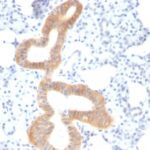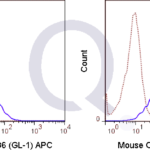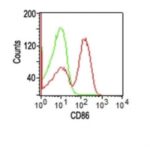Mouse Anti-CD86 Antibody Product Attributes
Species: Mouse
Tested Applications: Flow Cytometry.
Application Notes: See Product Datasheet for Recommended Dilution Range. Requires Experimental Optimization
Clonality: Monoclonal Antibody
Anti-CD86 Antibody Clone: PO3.1
Clone PO3.1 Host and Isotype: Rat IgG2b kappa
Buffer and Stabilizer: 10 mM NaH2PO4, 150 mM NaCl, 0.09% NaN3, 0.1% gelatin, pH7.2
Antibody Concentration: 0.2 mg/mL
Storage Conditions: 2-8C protected from light. Stable for 12 Months. Do Not Freeze.
CD86 Previously Observed Antibody Staining Patterns
Observed Antibody Staining Data By Tissue Disease Status:
Tissues from cancer patients, for instance, have their own distinct pattern of CD86 expression as measured by anti-CD86 antibody immunohistochemical staining. The average level of expression by tumor is summarized in the table below. The variability row represents patient to patient variability in IHC staining.
| Sample Type | breast cancer | carcinoid | cervical cancer | colorectal cancer | endometrial cancer | glioma | head and neck cancer | liver cancer | lung cancer | lymphoma | melanoma | ovarian cancer | pancreatic cancer | prostate cancer | renal cancer | skin cancer | stomach cancer | testicular cancer | thyroid cancer | urothelial cancer |
|---|---|---|---|---|---|---|---|---|---|---|---|---|---|---|---|---|---|---|---|---|
| Signal Intensity | ++ | ++ | + | ++ | ++ | + | + | ++ | ++ | ++ | ++ | + | ++ | + | – | + | ++ | ++ | ++ | ++ |
| CD86 Variability | ++ | ++ | ++ | + | ++ | ++ | ++ | ++ | ++ | ++ | ++ | ++ | ++ | ++ | ++ | ++ | ++ | + | + | ++ |
| CD86 General Information | |
|---|---|
| Alternate Names | |
| B7-2, B7.2 | |
| Curated Database and Bioinformatic Data | |
| Gene Symbol | Cd86 |
| Entrez Gene ID | 12524 |
| Ensemble Gene ID | ENSMUSG00000022901 |
| RefSeq Protein Accession(s) | XP_011244114, XP_006521804, NP_062261 |
| RefSeq mRNA Accession(s) | XM_011245812, XM_006521741, XR_384517, NM_019388 |
| RefSeq Genomic Accession(s) | NC_000082 |
| UniProt ID(s) | Q549Q9, Q61238, P42082 |
| UniGene ID(s) | Q549Q9, Q61238, P42082 |
| Cosmic ID(s) | Cd86 |
| KEGG Gene ID(s) | mmu:12524 |
| General Description of CD86. | |
| The PO3.1 antibody reacts with mouse CD86, also known as B7-2, an 80 kDa cell surface protein which is a ligand for CD28, a co-stimulatory receptor for the T cell receptor (TCR). CD28 can also bind a second B7 ligand known as CD80 (B7-1). Both CD80 and CD86 are expressed on activated B cells and antigen-presenting cells. These ligands trigger CD28 signaling in concert with TCR activation to drive T cell proliferation, induce high-level expression of IL-2, impart resistance to apoptosis, and enhance T cell cytotoxicity. The interaction / co-stimulatory signaling between the B7 ligands and CD28 provides crucial communication between T cells and B cells or APCs to coordinate the adaptive immune response.The PO3.1 antibody may be used as a marker for CD86 expression on B cells, macrophages, and dendritic cells. | |
Selected References
Ioannou M, Alissafi T, Lazaridis I, Deraos G, Matsoukas J, Gravanis A, Mastorodemos V, Plaitakis A, Sharpe A, Boumpas D, and Vergiinis P. 2012. J. Immunol. 188: 1136-1146. (Flow cytometry)Zhang J, Kawashima N, Suda H, Nakano Y, Takano Y, and Azuma M. 2006. Int. Immunol. 18: 1375-1384. (Immunohistochemistry – frozen tissue)Kin NW and Sanders VM. 2006. J. Immunol. 176: 6727 – 6735. (in vitro activation)Spadaro M, Ambrosino E, Iezzi M, Di Carlo E, Sacchetti P, Curcio C, Amici A, Wei W-Z, Musiani P, Lollini P-L, Cavallo F, Forni G. 2005. Clin. Cancer Res. 11: 1941-1952. (Immunohistochemistry – frozen tissue)Pokojil JRIwai H, Kozono Y, Hirose S, Akiba H, Yagita H, Okumura K, Kohsaka H, Miyasaka N, and Azuma M. 2002. J. Immunol. 169: 4332-4339. (in vitro activation)
Limitations and Warranty
enQuire Bio’s Mouse Anti-CD86 Monoclonal is available for Research Use Only. This antibody is guaranteed to work for a period of two years when properly stored.

![Anti-CD86 Antibody [PO3.1]](https://cdn-enquirebio.pressidium.com/wp-content/uploads/2017/10/enQuire-Bio-QAB93-PE-100ug-anti-CD86-antibody-10.png)

![Anti-CD86 Antibody [IT2.2]](https://cdn-enquirebio.pressidium.com/wp-content/uploads/2017/10/enQuire-Bio-QAB94-PE-100Tests-anti-CD86-antibody-10-150x150.png)




There are no reviews yet.